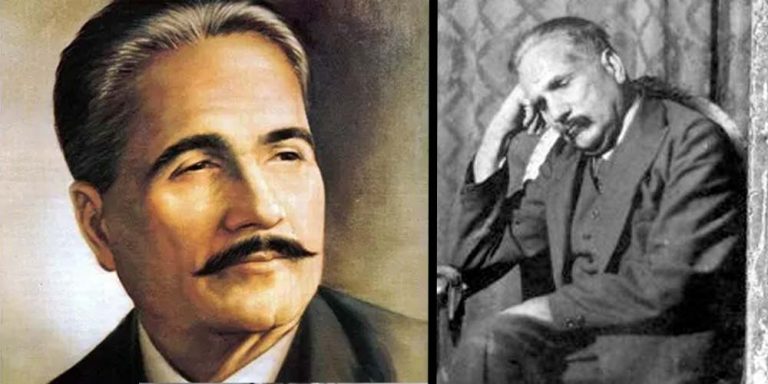
Nation observes 142nd birth anniversary of poet Dr. Allama Iqbal

“Vision without power does bring moral elevation but cannot give a lasting culture”
Dr. Allama Iqbal, widely known as Poet of the East, was born on 9 November 1877 in an ethnic Kashmiri family in Sialkot in the Punjab Province. His family was Kashmiri Brahmin Sapru which had converted to Islam.
دیارِ عشق میں اپنا مقام پیدا کر
نیا زمانہ، نئے صبح و شام پیدا کر
Iqbal was influenced by the teachings of Sir Thomas Arnold, his philosophy teacher at Government College Lahore. Arnold’s teachings convinced Iqbal to pursue higher education in the West, and in 1905, he travelled to England for that purpose.
In 1907, Iqbal moved to Germany to pursue his doctoral studies, and earned a Doctor of Philosophy degree from the Ludwig Maximilian University of Munich in 1908.
Iqbal’s poetry was translated into many European languages in the early part of the 20th century, when his work was famous. Iqbal’s Asrar-i-Khudi and Javed Nama were translated into English by R. A. Nicholson and A. J. Arberry, respectively.
In 1933, after returning from a trip to Spain and Afghanistan, Iqbal suffered from a mysterious throat illness. He spent his final years helping Chaudhry Niaz Ali Khan to establish the Dar ul Islam Trust Institute at Jamalpur estate near Pathankot, where there were plans to subsidise studies in classical Islam and contemporary social science. He also advocated for an independent Muslim state.
Ideologically separated from Congress Muslim leaders, Iqbal had also been disillusioned with the politicians of the Muslim League, owing to the factional conflict that plagued the League in the 1920s.
Iqbal’s close correspondence with Jinnah is speculated by some historians as having been responsible for Jinnah’s embrace of the idea of Pakistan. Iqbal elucidated to Jinnah his vision of a separate Muslim state in a letter sent on 21 June 1937:
A separate federation of Muslim Provinces, reformed on the lines I have suggested above, is the only course by which we can secure a peaceful India and save Muslims from the domination of Non-Muslims. Why should not the Muslims of North-West India and Bengal be considered as nations entitled to self-determination just as other nations in India and outside India are.
Iqbal’s views on the Western world were applauded by men including United States Supreme Court Associate Justice William O. Douglas, who said that Iqbal’s beliefs had “universal appeal”. Soviet biographer N. P. Anikoy wrote:
[Iqbal is] great for his passionate condemnation of weak will and passiveness, his angry protest against inequality, discrimination and oppression in all forms i.e., economic, social, political, national, racial, religious, etc., his preaching of optimism, an active attitude towards life and man’s high purpose in the world, in a word, he is great for his assertion of the noble ideals and principles of humanism, democracy, peace and friendship among peoples.
Iqbal died in Lahore on 21 April 1938. His tomb is located in Hazuri Bagh, the enclosed garden between the entrance of the Badshahi Mosque and the Lahore Fort, and official guards are provided by the Government of Pakistan.
A smartly turned out contingent of Pakistan Navy took charge of the guard duties.
Station Commander of Pakistan Navy, Commodore Naimatullah Khan, who was the chief guest of the ceremony, laid floral wreath at the Mazar and offered fateha.
He also noted down his impressions on the visitors book.
Read More News On
Catch all the Pakistan News, Breaking News Event and Latest News Updates on The BOL News
Download The BOL News App to get the Daily News Update & Follow us on Google News.
Leave a Comment
You must be logged in to post a comment.



